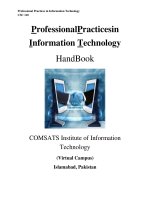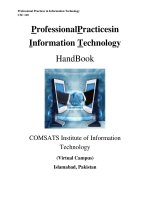Lecture Note Professional practices in information technology - Lecture No. 7: Ethical and Social Issues in Information Systems
Bạn đang xem bản rút gọn của tài liệu. Xem và tải ngay bản đầy đủ của tài liệu tại đây (373.27 KB, 6 trang )
Professional Practices in Information Technology
CSC 110
ProfessionalPracticesin
Information Technology
HandBook
COMSATS Institute of Information
Technology
(Virtual Campus)
Islamabad, Pakistan
Professional Practices in Information Technology
CSC 110
Lecture 07
Ethical and Social Issues in Information Systems
7.1 Introduction
While studying Ethical and Social Issues in Information Systems, the following questions need
to be answered:
– What ethical, social, and political issues are raised by information systems?
– What specific principles for conduct can be used to guide ethical decisions?
– Why do contemporary information systems technology and the Internet pose challenges to
the protection of individual privacy and intellectual property?
– How have information systems affected everyday life?
Behavioral Targeting and Your Privacy: You’re the Target
Problem: Need to efficiently target online ads
Solutions: Behavioral targeting allows businesses and organizations to more precisely target
desired demographics. Google monitors user activity on thousands of sites; businesses monitor
own sites to understand customers. Demonstrate its role in organizing and distributing
information. Illustrates the ethical questions inherent in online information gathering
7.2 Understanding Ethical and Social Issues Related to Systems
Professional Practices in Information Technology
CSC 110
Recent cases of failed ethical judgment in business:
– Lehman Brothers, Minerals Management Service, Pfizer
– In many, information systems used to bury decisions from public scrutiny
Ethics:
– Principles of right and wrong that individuals, acting as free moral agents, use to make
choices to guide their behaviors
Information systems and ethics: Information systems raise new ethical questions because they
create opportunities for:
– Intense social change, threatening existing distributions of power, money, rights, and
obligations
– New kinds of crime
Model for thinking about ethical, social, political issues:
– Society as a calm pond
– IT as rock dropped in pond, creating ripples of new situations not covered by old rules
– Social and political institutions cannot respond overnight to these ripples—it may take years
to develop etiquette, expectations, laws
– Requires understanding of ethics to make choices in legally gray areas
Professional Practices in Information Technology
CSC 110
The Relationship Between Ethical, Social, and Political Issues in An
Information Society
Figure 41: The Relationship between Ethical, Social, and Political Issues in an
Information Society
The introduction of new information technology has a ripple effect, raising new ethical, social,
and political issues that must be dealt with on the individual, social, and political levels. These
issues have five moral dimensions: information rights and obligations, property rights and
obligations, system quality, quality of life, and accountability and control.
Five moral dimensions of the information age
– Information rights and obligations
– Property rights and obligations
– Accountability and control
Professional Practices in Information Technology
CSC 110
– System quality
– Quality of life
7.3 Key technology trends that raise ethical issues
Doubling of computer power
– More organizations depend on computer systems for critical operations
Rapidly declining data storage costs
– Organizations can easily maintain detailed databases on individuals
Networking advances and the Internet
– Copying data from one location to another and accessing personal data from remote locations
is much easier
Advances in data analysis techniques
Companies can analyze vast quantities of data gathered on individuals for:
Profiling
– Combining data from multiple sources to create dossiers of detailed information on
individuals
Non obvious relationship awareness (NORA)
– Combining data from multiple sources to find obscure hidden connections that might help
identify criminals or terrorists
Professional Practices in Information Technology
CSC 110









